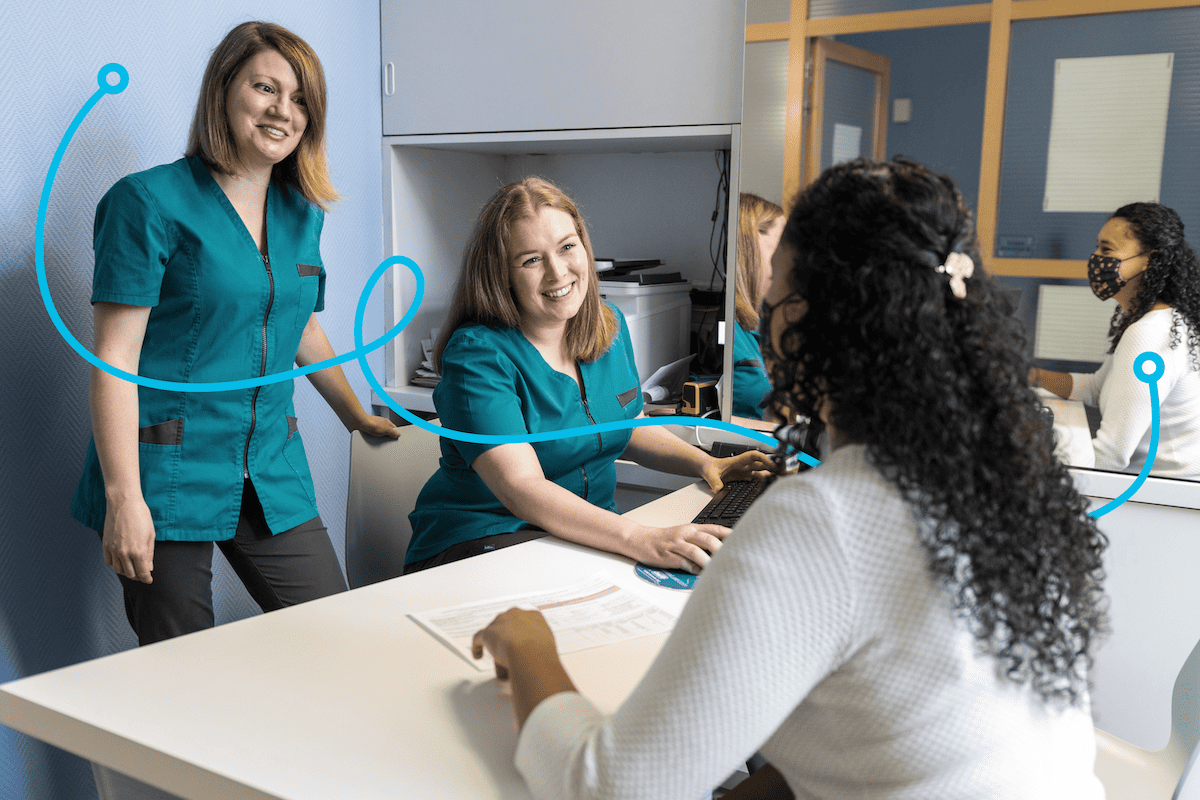For some, a visit to the dentist can conjure up images of sharp instruments, unfamiliar sounds, and an impending sense of discomfort. Dental anxiety is an incredibly common phenomenon. In fact, the Cleveland Clinic reports that over 35 percent of American adults experience dental anxiety. Nervous patients are less likely to visit your practice and may neglect crucial dental care as a result. When they don’t seek the vital oral care they need, appointments can become even harder to navigate, and more invasive procedures may become necessary.
The good news is, You have the power to transform how apprehensive patients feel about dentist appointments. Transform worried patients into confident ones with a bit of patient education. Knowledge is power, after all! With a little education, patient satisfaction is sure to increas. When you have educatad patients, your job becomes infinitely more manageable. You can play a pivotal role in reshaping people’s perceptions of dentistry and reducing anxiety, all at the same time, with excellent educational resources.
A brief blog overview
This blog covers the art of patient education and the ensuing boost in patient satisfaction. Help your patients understand their oral health and the procedures you perform. When they are empowered by the importance of regular dental checkups, they’ll embrace future appointments with enthusiasm instead of trepidation.
Here’s a quick list of what we’ll cover—read on for more!
- Addressing anxiety
- Personalized consultations
- Educational resources
- Collaboration with other medical providers
Delve into patient education and explore the myriad ways it fosters trust, reduces fear, creates a positive dental experience for all involved, and boosts patient satisfaction. From explaining the ins and outs of common cleanings to sharing tips for maintaining excellent oral hygiene and beyond, this blog is chock full of insights and strategies that you can deploy to help your patients.
Embrace the transformative power of knowledge, and you’ll not only mend smiles, but you’ll also nurture a community of informed and fearless patients.
Address the elephant in the room
It’s okay, and in fact, it is welcome to acknowledge the presence of anxiety. Patients may be too shy or even ashamed to admit they are worried about going to the dentist. Begin visits on the right foot by showing you yourself are educated about dental anxiety. A simple and straightforward question like “Are you anxious about going to the dentist?” is easy enough to ask and begins the conversation. Psychologists agree that accepting and noticing anxious behaviour is an integral part of moving through worrying emotions. By showing your patients that you openly understand the anxiety that a dental visit can induce, you can better understand their unique needs.
Start the conversation, and you’ll begin the educational process. From there, patient satisfaction follows.
Some key things to understand about navigating anxiety can include:
- The level of involvement patients desire–maybe they want to know everything that is happening every step of the way. Or perhaps knowing less is better. Leave it up to them
- Identifying specific triggers such as sounds, sensations, and even scents
- Building a plan of action together throughout the care process and creating agreed-upon steps to do in case the anxiety becomes
 overwhelming or transforms into a panic attack
overwhelming or transforms into a panic attack - Let your patients know that they are always in control—if they need a break, they are free to ask for it
- Emphasize the importance of dental care without using scare tactics. Straightforward and clear communication that’s based on science and studies may help anxious people see the seriousness of good oral hygiene without clouding their judgment
Personalized consults for patient satisfaction
One-on-one consultations with a dentist can be a powerful antidote to dental anxiety, serving as a bridge between fear and comfort in the dental chair. These personalized sessions offer numerous benefits that can significantly alleviate anxiety. This is an excellent opportunity to educate your patients on what to expect when they visit. And they can be done totally virtually! Ease anxious patients into a dental routine by offering an early consultation designed with education and communication in mind.
Personalized consults, whether over the phone, via Zoom, or in person, are a powerful learning opportunity for everyone involved.
Here’s how they help:
- Establish trust. Meeting face-to-face allows patients to build a rapport with their dentist, fostering confidence and a sense of familiarity. This connection reassures patients that their concerns are being heard and understood.
- Addressing specific fears. Dentists can delve into the root causes of a patient’s anxiety, whether it’s fear of pain, past traumatic experiences, or general unease. By identifying these triggers, dentists can tailor their approach to minimize discomfort.
- Clear communication. Patients can openly discuss their questions and concerns about upcoming procedures. Dentists can explain the process in detail, dispelling myths and misconceptions and ensuring patients know what to expect.
- Discussing sedation options. Dentists can educate patients about available sedation methods, helping them make informed decisions about their comfort level during treatment.
- Customized strategies. Dentists can provide personalized coping strategies, such as relaxation techniques or distractions, to help patients manage anxiety during their visit.
- Creating a comfortable environment. Patients can voice their preferences, from the choice of music during the procedure to accommodations for any sensory sensitivities or claustrophobia.
- Follow-up care. Dentists can develop a post-treatment plan to ensure patients recover comfortably and are encouraged to continue their oral health care.
These consultations empower patients by placing them at the center of their dental care. The information, support, and empathy provided during these sessions can transform dental visits from sources of dread into opportunities for positive, anxiety-free experiences, ultimately promoting better oral health and overall well-being.
All about providing educational resources
In this day and age, there’s a whole host of fantastic information available online. A lot of what’s out there can help educate your patients—take advantage of it! These resources cater to various learning preferences and comfort levels, so there is truly something for everyone. Scour the Internet or produce your own content that aims to educate, empower through knowledge, provide emotional support, and dispel myths.
Some ideas to get you started can include:
- Online videos: Dentists and dental organizations create informative videos that demystify common dental procedures and share patient testimonials to make your people feel more at home. See platforms like YouTube for this content that is easily accessible to anyone in need of a little extra reassurance.
- Take-home or PDF pamphlets: Brochures can cover topics like oral hygiene, the importance of routine checkups, and anxiety reduction techniques. They can also address the ins and outs of a cleaning or other procedures. These tangible resources are valuable resources patients can revisit at their convenience.
- Interactive website: Make your practice’s online presence awesome! Provide articles, videos, FAQs, seminars, and more that patients can get to from the comfort of their own homes. Chat features also allow them to ask real-time questions that increase their educational level and ease their anxiety
- Suggest support groups: Anxious patients are not alone. There are plenty of online support communities and forums that serve as safe spaces for individuals to share dental anxiety experiences. Here, they can get advice, learn new coping mechanisms, and receive emotional support from people who are in the same boat. This is camaraderie and education all rolled into one!
By offering these diverse educational resources, your practice ensures that individuals with dental anxiety have access to information and the support that suits their individual needs.
Collaboration with other medical providers
Patients, anxious or not, may be surprised to hear how much their oral health is linked to their overall well-being. Educating patients on the intertwined factors of good oral hygiene and a healthier lifestyle can be a significant driving factor in getting patients to care about coming to the dentist. Some of the health issues that oral health factors indicate for or contribute to include:
- Heart tissue health

- Pregnancy and reproductive complications
- Cardiovascular disease
- Respiratory disease
- Diabetes
- Cancer
When you educate your patients on how their oral health may be affecting other facets of their lives, they may be more inclined to conquer feelings of anxiety and visit the dentist. Don’t try and scare them into coming to you, though! Simply state the facts and let them know you care that they live the best life possible, including dental checkups and regular cleaning.
The big picture of patient satisfaction
The journey to reducing dental anxiety is paved with educational resources and compassionate strategies. Acknowledging the prevalence of dental anxiety is the first step, and it’s essential to do so with empathy and understanding. By proactively engaging anxious patients in one-on-one consultations, dental professionals can build trust, tailor treatment plans, and foster open communication. These consultations empower patients to take control of their oral health journey and transform dental visits from sources of dread into positive experiences.
Moreover, the availability of diverse educational resources, including online videos, take-home pamphlets, interactive websites, and support groups, plays a pivotal role in reducing dental anxiety. Patients can access knowledge, dispel myths, and find emotional support through these resources, all contributing to their overall confidence in seeking dental care.
Collaboration with other medical providers, such as mental health experts, further strengthens the support network for anxious patients, providing holistic care that addresses both their dental and emotional well-being. By emphasizing the profound impact of oral health on overall health and quality of life, dentists can motivate patients to prioritize regular check-ups and hygiene routines.
How does Intiveo fit in?
Reducing patient anxiety through clear communication and education is made all the easier with a bit of help from Intiveo’s toolkit. Our clients have seen tangible and trackable improvements in patient satisfaction when they tap into Intiveo’s resources that are designed to make your job easier and soothe anxious patient’s worries.
- Online educational resources
- Chat software
- Auto appointment reminders
- Feedback and review prompts help you educate yourself on patient needs moving forward
- Follow-up communication, care, and education over email and text.
Intiveo can help you deliver excellent care to your patients, no matter what they need. These are the lasting relationships and cornerstones of trust that you can build a successful business on! Book a meeting today and learn more.






